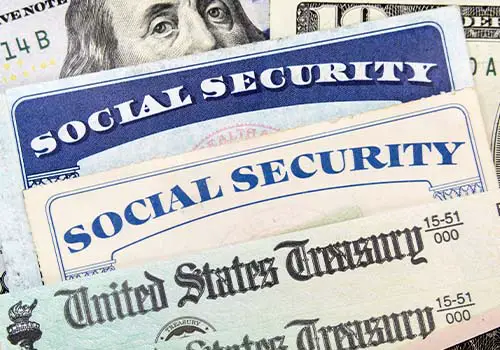Social Security retirement benefits and Medicare coverage often go hand in hand. Many people might think that Medicare is the only option for health insurance coverage once you start receiving Social Security benefits. Others wonder whether you are automatically enrolled in Medicare if you receive Social Security.
Some people will be enrolled automatically in Medicare, while others must sign up independently. If you are approaching the eligibility age for Medicare, you should keep reading!
We will tell you everything you should know about getting Medicare benefits while on Social Security. In addition, we will discuss who qualifies for Medicare and how you can receive Social Security without enrolling in Medicare.
Medicare Enrollment For Social Security Beneficiaries
Automatic Enrollment
Manual Enrollment
If you are not receiving Social Security benefits at age 65, you must apply for Medicare and enroll independently. Your initial enrollment period begins three months before your 65th birthday and runs until three months after your 65th birthday. Failure to sign up during this period can result in late enrollment penalties and higher premiums.
Opting Out of Coverage
Most people receive premium-free Part A coverage, although a monthly premium is associated with Part B coverage. For this reason, some people choose to opt out of their Part B benefits. Still, others opt out of both Part A and B because they are still working and are covered by a health plan through their employer. Remember that Medicare is funded with taxes you pay while working. You won’t need to pay a monthly premium for Part A coverage as long as you have sufficient work history.
Alternative Coverage
You will only receive Original Medicare by default whether you are enrolled automatically or signed up independently. If you wish to purchase a Medicare Advantage plan, Medigap supplement insurance, or a Medicare Part D prescription drug plan, you must sign up for one of those items on your own. You should also sign up for these plans during your initial enrollment period because waiting until later can cost you more money.
KEY TAKEAWAYS
- If you begin receiving Social Security before your 65th birthday, you will automatically be enrolled in Original Medicare when you reach 65.
- You must opt out of Medicare Part B if you don’t want to incur a monthly premium. You can choose to decline coverage altogether or delay coverage until a later date.
- Individuals diagnosed with Lou Gehrig’s disease (ALS) or end-stage renal disease (ESRD) are eligible for immediate Medicare coverage, but you must manually apply.
Receiving Social Security Benefits Without Medicare
You likely already know that you can start your Social Security benefits as early as age 62, and you don’t qualify for Medicare until you reach age 65. So, you can receive Social Security retirement benefits for three years before starting Medicare. However, once you hit your 65th birthday, you will automatically be enrolled in Medicare if you have already received Social Security. What happens if you want to get your Social Security benefits without getting Medicare?
Declining Medicare Coverage
You can decline Medicare coverage and still receive Social Security. Since there is a monthly Part B premium, many people decline their Part B coverage and receive only Medicare Part A hospital insurance.
Delaying Medicare Coverage
Many Americans working later in life are still covered through an employer-sponsored health care plan when they reach age 65. Some special rules apply if you are still receiving medical insurance through your employer when you become eligible for Medicare.
You can choose to delay your enrollment in Medicare and will not need to pay the late enrollment penalty if you meet the requirements. This means that you can sign up for Medicare when you leave your employer and won’t be penalized.
The exception mentioned above allows many people to receive Social Security without Medicare. They continue receiving health coverage through their employer, even though they get a monthly Social Security check. When they leave their current employment, they enroll in Medicare and begin to receive those benefits.
Must read articles related to Medicare
- Steps to sign up for Medicare
- What documents do I need to apply for Medicare?
- How do I appeal a Medicare denial notice?
- What does Medicare Part A cover?
- How do you get a Medicare Flex card for seniors?
Medicare & Social Security Disability Benefits
We have mainly discussed the basics of Medicare related to retirees and Social Security retirement benefits. However, you can also qualify for Medicare when you receive Social Security disability insurance (SSDI) benefits from the Social Security Administration (SSA).
- Once you have received disability benefits for 24 months, you will automatically be enrolled in Medicare.
Immediate Medicare Benefits
If you are disabled, there is usually a 24-month waiting period before your Medicare benefits begin. However, that waiting period does not apply to some individuals with certain conditions.
- If you have been diagnosed with end-stage renal disease (ESRD), you will qualify for Medicare benefits right away.
- Similarly, those with amyotrophic lateral sclerosis (ALS) or Lou Gehrig’s disease will be eligible for immediate Medicare benefits.
These diagnoses will qualify you for immediate benefits, but you must still apply. You will not be automatically enrolled in coverage. You can contact your local Social Security office or Centers for Medicare & Medicaid Services office to apply for coverage. You can also apply for Medicare online or call Social Security at 1-800-772-1213.
SSI Beneficiaries
Some people also wonder whether you can receive Medicare if you receive Supplemental Security Income (SSI) benefits. SSI benefits do not qualify you for Medicare. If you receive SSI benefits, you will likely be eligible for Medicaid through your state’s Medicaid office. You should contact your state’s Medicaid office to enroll in that program.
Opting Out Of Medicare Coverage
Many people wonder whether you can opt out of Medicare coverage. The answer is yes. Since most people receive premium-free Part A coverage, very few people opt out of their Part A coverage. This provides hospital insurance at no cost to most qualifying individuals.
- Even if you are still employed and covered through a group health plan, Medicare Part A can provide additional insurance that might help cover some of your health care expenses.
Many ask, “Do I have to apply for Medicare Part B?” The answer is no. People often opt out of this coverage because a premium is attached to it.
There are a couple of essential things to know about opting out. If you do not sign up for coverage during your initial enrollment period, you might end up paying more for coverage when you sign up. We will discuss more details in the next section about signing up for Medicare after your 65th birthday.
TIP
Most people qualify for premium-free Medicare Part A coverage, so even if an employer health insurance plan covers you, it is usually in your best interest to enroll in Part A upon turning 65.
Enrolling In Medicare Past Age 65
There is nothing that prohibits you from enrolling in Medicare after age 65. You may have chosen to opt out of Medicare upon reaching age 65, but you decided later to enroll in coverage.
Special vs General Enrollment
Special Enrollment: If you were still employed and covered through a group health plan after age 65, you would generally be eligible for a special enrollment when your group plan ends. This means you can sign up for coverage without late enrollment penalties. You can also sign up for supplemental Medicare coverage without paying higher premiums or undergoing full medical underwriting.
General Enrollment: If you do not qualify for a special enrollment period, you must sign up for coverage during a general enrollment period. This is the annual enrollment period during which you can sign up for Original Medicare, prescription drug coverage, or Medicare Part C – Medicare Advantage plans.
Signing up during general enrollment after your 65th birthday means you will likely pay a late enrollment penalty and higher premiums.
Medigap Restrictions
Regarding Medigap insurance, you could be wholly denied coverage if you sign up late. Remember that private insurance companies manage these plans. While the law guarantees that your policy will be issued for the lowest premium if you sign up on time, waiting until after your 65th birthday means you must complete a whole underwriting process.
These companies may charge you more for your policy based on your health history and pre-existing conditions. They could even completely deny your application. As you can see, deciding when to apply for Medicare could have lasting effects for the rest of your life.
The Bottom Line
If you already receive Social Security upon reaching your 65th birthday, you will be automatically enrolled in Medicare coverage and will receive your Medicare card in the mail.
If you are not receiving Social Security benefits, you must manually enroll in Medicare coverage. Waiting past your initial enrollment period might cost you more money through higher premiums and late enrollment penalties. However, those still employed and covered through a group health plan will qualify for a special enrollment period that allows them to sign up late for Medicare without additional fees or penalties.
It is possible to completely opt out of Medicare even if you receive Social Security benefits, although very few people choose this option.
Frequently Asked Questions
Yes, you can collect Social Security benefits and not receive Medicare. There are a couple of ways to do this.
- First, you can start your Social Security benefits early. If you start your benefits at 62, you will not qualify for Medicare yet.
- You could also opt out of Medicare even though you receive Social Security.
- Finally, you could delay your Medicare benefits if you are still employed and covered through a group health plan.
The last option allows you to sign up for Medicare when your group coverage ends without paying any penalties or late fees.
Yes, most people choose to have their Medicare premium deducted directly from their Social Security check. However, this generally only applies to your Medicare Part B premium.
If you choose to enroll in a Medicare Advantage plan or Medigap coverage, you will likely need to pay your insurance company each month to cover your premium.
So, at what age does Medicare start? You become eligible for Medicare upon reaching age 65.
- You can also qualify for Medicare after receiving Social Security disability benefits (SSDI) for 24 months.
- Those diagnosed with ESRD or ALS immediately become eligible for Medicare.
You will automatically be enrolled in Medicare if you have received Social Security benefits when you reach age 65 or have received SSDI for 24 months. Otherwise, you must contact the Social Security office to enroll in coverage.
You must start paying for Medicare when you enroll in Part B coverage. Similarly, if you do not qualify for premium-free Part A coverage, you must pay as soon as you enroll.
If you decide to enroll in Medigap, Medicare Advantage, or prescription drug coverage, your insurance company will give you the details on your premium amount and due date.
Many people wonder, “When am I eligible for Medicare?” Generally, you become eligible at age 65 or after receiving SSDI benefits for 24 months.
You can find a Social Security Administration office near you by using our SSA office locator and searching for your closest location.







